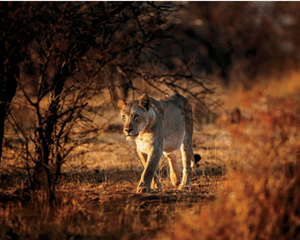South Africa's game parks risk going under. So do their animals.
南非的狩獵公園面臨危機,那里的動物也是如此。
On March 26, The day south Africa closed its borders to help curb the spread of COVID-19, Kayla Wilkens thought of only one thing: How was she going to feed the elephants?
3月26日,也就是南非為了抑制新冠的傳播而關閉邊境的那一天。在這一天,凱拉·威爾肯斯只想著一件事:以后大象怎么喂?
Wilkens, the general manager of the privately owned Fairy Glen safari resort, about 71 miles outside of Cape Town, knew that the park's budget depended on tourism. Without that income, taking care of the lions, rhinos, zebras and antelope that populate the 1,235-acre reserve would be difficult. That night, Wilkens sat down with her partner and Fairy Glen owner, Pieter De Jager, to map out the future. If they gave up their own salaries, laid off all but two of their 30 staff, stopped security patrols and put off repairs, they figured they just might make it for a couple of months. After that, though, they would have to prepare for the worst.
威爾肯斯是一家私營的名為“仙女谷”的狩獵度假村的總經理,該度假村位于開普敦城外約71英里(約合71公里)的地方。威爾肯斯知道公園的收入依靠旅游業,沒有了這筆收入,要照顧這片1235英畝的公園里的獅子、犀牛、斑馬和羚羊將會非常困難。當晚,威爾肯斯和她的老公,即仙女谷的所有者彼得·德·雅格坐下來對未來做一個規劃。如果他們放棄自己的收入,解雇30名員工中的28名,不再進行安全巡邏并推遲維修,那么他們只能再維持幾個月的時間。不過,幾個月之后他們就不得不做最壞的打算了。
"We had to force ourselves to think about maybe having to put down our animals rather than let them starve to death," she says, her voice cracking at the thought. "We can't just put them outside and expect them to look after themselves."
“我們必須強迫自己去思考,我們應該殺死我們的動物,而不是讓它們餓死。”說到這里,她的聲音嘶啞了。“我們不能把它們放在外面,指望它們能自己照顧自己。”

The elephants, rhinos, buffalo, lions and leopards that make up the classic safari "Big Five" checklist may be wild animals, but in South Africa's private game reserves, at least, the illusion of wilderness is built upon a scaffold of costly maintenance. Private reserves here spend hundreds of thousands of dollars a year to buy, feed, breed, care for and protect their animals, money that is recouped through safari drives and luxury accommodations. It is a privatized form of conservation that not only keeps endangered species alive but also guards vast tracts of biodiverse wilderness from development. The collapse in tourism during the coronavirus pandemic has brought many of South Africa's 500 or so private game parks to their knees, according to a survey by a tourism agency in the Kruger Lowveld district.
大象、犀牛、水牛、獅子和豹子組成了經典的“五大野生動物”清單,但至少在南非的私人禁獵區,荒野的假象是建立在昂貴的維護基礎之上的。這里的私人保護區每年要花費數十萬美元購買、喂養、繁殖、照料和保護那里的動物,這些錢會通過狩獵活動和豪華住宿來收回。這是一種私有化的保護形式,這樣不僅能夠使得瀕危物種得以存活,同時還保護了大片具備生物多樣性的荒野不被開發。克魯格洛維爾德地區一家旅游機構的調查顯示,南非有約500家私人狩獵公園,而新冠防控期間旅游業的陷落已經讓其中很多家陷入了困境。
Africa's great national parks are also at risk. Animals always live off the land in South Africa's giant Kruger park, and the even wilder Masai Mara of Kenya and Tanzania's Serengeti. African governments have long resisted pressure to otherwise exploit such areas because conservation and tourism promised to be even more long-lasting and lucrative, worth approximately $71 billion a year, according to the World Travel and Tourism Council. Now, with safaris at a standstill, funding for both private and public reserves is drying up, even as they face the ongoing expense of keeping their animals alive.
非洲最大的國家公園也面臨危機。動物們一直以南非巨大的克魯格公園、肯尼亞更為荒涼的馬賽馬拉和坦桑尼亞的塞倫蓋蒂的土地為食。長期以來,非洲各國政府一直拒絕對此類地區進行其他開發,因為靠保護和旅游業所獲利潤有望更持久且更豐厚,據世界旅游和旅游理事會稱,每年的利潤高達710億美元。如今,由于狩獵活動停滯不前,他們面臨的不僅僅是維持動物生存的持續性開支,整個私人和公共保護區的資金都在枯竭。
譯文由可可原創,僅供學習交流使用,未經許可請勿轉載。












